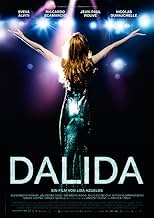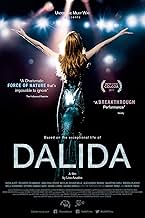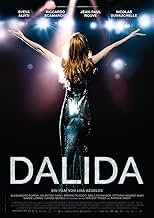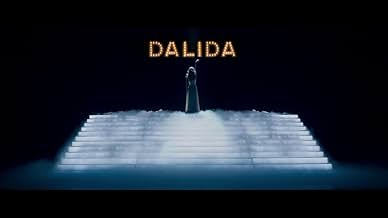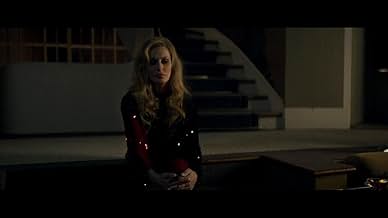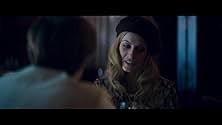ÉVALUATION IMDb
6,9/10
3,8 k
MA NOTE
L'histoire de la chanteuse égypto-italienne Dalida, son histoire contre la vie et comment elle a géré ses problèmes alors qu'elle était l'artiste la plus consacrée de l'histoire de France.L'histoire de la chanteuse égypto-italienne Dalida, son histoire contre la vie et comment elle a géré ses problèmes alors qu'elle était l'artiste la plus consacrée de l'histoire de France.L'histoire de la chanteuse égypto-italienne Dalida, son histoire contre la vie et comment elle a géré ses problèmes alors qu'elle était l'artiste la plus consacrée de l'histoire de France.
- Prix
- 1 nomination au total
F. Haydee Borelli
- Giuseppina Gigliotti
- (as Haydee Borelli)
Avis en vedette
With her powerful performances and dramatic emotional investment to her singing, unmatched even today, Egyptian born singer and actress, named by her Italian parents Yolanda Cristina Gigliotti, better known as Dalida, undoubtedly holds a unique place in the history of European and wider--including Middle East, Russia, Japan, Canada--popular music.
By the time I reached my teens (in early 1970's) a middle-aged gentleman from the neighbourhood has already accrued a good collection of Dalida's records, and that's how I was introduced to her singing, and remained her fan ever since, for four and half decades already. Contributive to that is the circumstance that last ten years I've been living and working in Lebanon, with Dalida's strong presence in its musical scene, and with her faithful audience, very much alive even three decades after her untimely demise.
That's why I have been very enthusiastic to see the movie based on her life, but also a bit concerned about it. Now that the movie is out and I have seen it, I'm very pleased to say that it has met my expectations to the greatest extent.
A number of elements are greatly contributing to the solid success and good quality of the French produced biopic, simply titled "Dalida" (2016). Based on my earlier findings and details known, story follows Dalida's life meticulously and faithfully, life filled with professional successes and personal torments and unhappiness. Actors have done an extraordinary job, which is especially important in the case of the leading actress, Sveva Alviti, who has brought to screen the title character--portrayed at the right measure, faithfully, decently and respectfully--but also actors impersonating key players in Dalida's life, her brothers (the younger one, Bruno-Orlando, plausibly depicted by Riccardo Scamarcio, performing as her career manager since 1966) as well as her professional companions, and partners in her private life. Finally, identification achieved thanks to the fascinating physical resemblance of the leading actress, as well as her successfully accomplished impression of Dalida's on-stage (and otherwise) presence and mannerisms, is certainly not disadvantageous.
According to her biographers, Dalida performed and recorded in more than ten different languages, while being fluent in at least half of that number. However, due to the fact that her career has shot to stardom in France, and her success has been most persistently maintained across the French-speaking music scene, lyrics of her songs are mainly in French. Therefore, to me, a non-French speaker, her songs were appealing primarily because of the power of her performance, ranging between its modest intimacy and dramatic intensity. Henceforth, only after watching this movie subtitled in English I have realized how much lyrics used in her songs were matching the on-goings in her own life. As if song makers and lyricist were retelling her life in real time. Having her screenplay based on the book written by Dalida's already mentioned brother Orlando, and thanks to proper choice of such songs with real life-relating lyrics, and their excellent timing, screenplay writer and director, Ms. Lisa Azuelos, has offered to the viewers most dramatic and suggestive revelations, easily implying such exciting, and--within the context of Dalida's private life troubled by failed relationships and personal difficulties, mishaps and tragedies--often touching connections between the songs and reality.
Though shot as biography feature film (biopic), meant primarily to entertain, then to inform, by appearing so well connected to reality, true to the facts, naturally gaining from the circumstance that the main actress is almost a dead ringer for Dalida, further inspired by clearly Dalida's own voice performing all included songs, it almost feels like watching a biography documentary.
To Dalida's faithful long-time followers, this is a great chance to reconfirm their fandom, to all others--including a co-spectator at the movie screening I attended, my wife Minnie--an excellent opportunity to get acquainted to this most gifted, duly celebrated singer, whose life was tragically cut short, but whose legacy, primarily her songs (but also, her high ranking as a personality, e.g. personality who had the greatest impact on French society), still lives and remains for posterity, as a pleasant reminder of her impressive and memorable talents.
By the time I reached my teens (in early 1970's) a middle-aged gentleman from the neighbourhood has already accrued a good collection of Dalida's records, and that's how I was introduced to her singing, and remained her fan ever since, for four and half decades already. Contributive to that is the circumstance that last ten years I've been living and working in Lebanon, with Dalida's strong presence in its musical scene, and with her faithful audience, very much alive even three decades after her untimely demise.
That's why I have been very enthusiastic to see the movie based on her life, but also a bit concerned about it. Now that the movie is out and I have seen it, I'm very pleased to say that it has met my expectations to the greatest extent.
A number of elements are greatly contributing to the solid success and good quality of the French produced biopic, simply titled "Dalida" (2016). Based on my earlier findings and details known, story follows Dalida's life meticulously and faithfully, life filled with professional successes and personal torments and unhappiness. Actors have done an extraordinary job, which is especially important in the case of the leading actress, Sveva Alviti, who has brought to screen the title character--portrayed at the right measure, faithfully, decently and respectfully--but also actors impersonating key players in Dalida's life, her brothers (the younger one, Bruno-Orlando, plausibly depicted by Riccardo Scamarcio, performing as her career manager since 1966) as well as her professional companions, and partners in her private life. Finally, identification achieved thanks to the fascinating physical resemblance of the leading actress, as well as her successfully accomplished impression of Dalida's on-stage (and otherwise) presence and mannerisms, is certainly not disadvantageous.
According to her biographers, Dalida performed and recorded in more than ten different languages, while being fluent in at least half of that number. However, due to the fact that her career has shot to stardom in France, and her success has been most persistently maintained across the French-speaking music scene, lyrics of her songs are mainly in French. Therefore, to me, a non-French speaker, her songs were appealing primarily because of the power of her performance, ranging between its modest intimacy and dramatic intensity. Henceforth, only after watching this movie subtitled in English I have realized how much lyrics used in her songs were matching the on-goings in her own life. As if song makers and lyricist were retelling her life in real time. Having her screenplay based on the book written by Dalida's already mentioned brother Orlando, and thanks to proper choice of such songs with real life-relating lyrics, and their excellent timing, screenplay writer and director, Ms. Lisa Azuelos, has offered to the viewers most dramatic and suggestive revelations, easily implying such exciting, and--within the context of Dalida's private life troubled by failed relationships and personal difficulties, mishaps and tragedies--often touching connections between the songs and reality.
Though shot as biography feature film (biopic), meant primarily to entertain, then to inform, by appearing so well connected to reality, true to the facts, naturally gaining from the circumstance that the main actress is almost a dead ringer for Dalida, further inspired by clearly Dalida's own voice performing all included songs, it almost feels like watching a biography documentary.
To Dalida's faithful long-time followers, this is a great chance to reconfirm their fandom, to all others--including a co-spectator at the movie screening I attended, my wife Minnie--an excellent opportunity to get acquainted to this most gifted, duly celebrated singer, whose life was tragically cut short, but whose legacy, primarily her songs (but also, her high ranking as a personality, e.g. personality who had the greatest impact on French society), still lives and remains for posterity, as a pleasant reminder of her impressive and memorable talents.
Great Movie i went to see the movie in Egypt Cairo last week..and guess what i watched it Twice..same day two times back to back ( the cinema was packed with Dalida fans from older and younger generation) it was worth the time and money spent... those who are find of the great singer ..her music her songs her voice or those who lived that era would defiantly like the film..i wont repeat what was written in previous reviews..ill just add that one the film strength elements is that places it was shot in...they reflected her reality places..Although her childhood part was Filmed in Morocco which is not the case..not in Egypt Shobra Neighbor Hood where she was born and Raised..Nor Alexandria city when she lived as well...therefore even the Arabic Language in this part of the film is with a strange accent that is Moroccan not Egyptian..i wished they filmed in in her original places. i give the actress a high mark for the effort in Imitating every single gesture hair and makeup,,perfect... one of the Goofs is that they missed adding the most important Egyptian Song ( Kela Helwa W Kelmetain- a nice word or two) which she sang right before her suicide and was a major Hit worldwide.i was disappointed they omitted that song in the film. recommend to be watched and i w'd defiantly watch it again for a third time
I really enjoyed watching this movie since I'm a huge fan of Dalida and her music so I really wanted to learn more about her life story through a biographical film like this one. This film however seems to fall short in several aspects, and I will try to list them all here with further explanation.
First of all, the film spends too much time using flashbacks going between the present, the past, and then to the present/future again, which creates a lot of confusion and makes you wonder, what point in time are we in exactly? Which events happened first? Are we now watching Dalida in the present or the past or something else? Flashbacks can be a great way to tell different parts of a story, but using them in excess like in this film and in such a disorganized way really just brings down the level of enjoyment of watching the film. Considering the film is about 2 hours long, the first 40 minutes or so of the film involved almost non-stop flashbacks between Dalida's attempt of suicide to her past relationship with Luigi Tenco, to her childhood, back to her psychiatrist's office, and back to different events. What is the director's point of view in all this? It just creates confusion and doesn't serve the movie well in my opinion.
The second point is the choice of cast. Anyone who knows the real Dalida knows that she had a real presence and physical beauty that showed off on and off her stage. The actress who played Dalida did not have any physical resemblance to her and I was not convinced for one moment that I am watching Dalida. It just feels like I'm watching someone "pretending" to be Dalida, almost like an old MTV program where an ordinary person dresses and gets a chance to look like a famous celebrity for one whole day. I can't remember the name of this program now. Dalida for sure did not have such huge mouth with flawed teeth like the actress who played her in the movie, and her eyes were not the same. Her whole face in fact has no physical resemblance. Not much effort was made with makeup to even make her look like Dalida. They changed her hair styles a few times to match Dalida's different styles through different periods of her life and made her wear the same dresses and clothes. That was it! Considering that we were supposedly watching her life story from 1956-1987, I didn't see her face age one bit through almost 30 years of her life. Was she immortal? Not a single wrinkle in her face, eye bags, receding hair line, all makes you wonder if this was just a low-budget production.
Third: the sex scenes. I really don't understand what is the point of adding so many sex scenes almost with every lover that Dalida was involved in. Is this an erotic movie or an autobiographical drama about the life of a celebrity? I'm not even sure if some of them were factual considering that it is very hard to know such intimate details about a celebrity like what she was doing in bed and with whom.
Fourth: Anyone who knows the life story of Dalida knows that she spent the first 22 years of her life in Cairo, Egypt (her birth country). Yet, we only saw Dalida's life in Egypt for barely a few minutes as an infant and as a child with her family. What about her adolescence and her life as an adult woman? In reality, Dalida was a rising star and well known person in Egypt thanks to winning the Miss Egypt beauty pageant in 1954, and participating in several films including her main role in the Arabic film Sigara we Kass (A Cigarette and a Glass) by the Egyptian director Niazi Mostafa also in 1954. Why were all these details omitted from the movie?
To make it even worse, we did not even see the development in her rise to fame in France-only just a very brief instant of how she was invited by Lucien Morisse to sign a contract for his music label. We didn't really see or understand how she left her family and entire life in Egypt, and how she arrived in France initially, or even how she decided to start a life as a singer, considering that she was previously an actress in Egypt.
Fifth: The music and Dalida's songs in the film. Simply there are too many songs in the film, which don't really serve the plot well. Yes some of them have lyrics which relate to that moment in her life and tell us how she feels or what is going on, but this also makes it difficult to understand the background behind these songs as we often see her singing a song with different events or things going on in her life quite quickly at the same time that the song is playing and without going into enough detail. This also leads me to ask: Is this a drama or a musical? Playing too many songs in the film while watching other events unfold at the same time just makes it shallow and lacking any depth that is important to understand the drama in her life.
Overall, an enjoyable film to watch, although it is quite shallow with many events unfolding very quickly and many others entirely omitted from the plot like the first 21 years of her life in Egypt.
First of all, the film spends too much time using flashbacks going between the present, the past, and then to the present/future again, which creates a lot of confusion and makes you wonder, what point in time are we in exactly? Which events happened first? Are we now watching Dalida in the present or the past or something else? Flashbacks can be a great way to tell different parts of a story, but using them in excess like in this film and in such a disorganized way really just brings down the level of enjoyment of watching the film. Considering the film is about 2 hours long, the first 40 minutes or so of the film involved almost non-stop flashbacks between Dalida's attempt of suicide to her past relationship with Luigi Tenco, to her childhood, back to her psychiatrist's office, and back to different events. What is the director's point of view in all this? It just creates confusion and doesn't serve the movie well in my opinion.
The second point is the choice of cast. Anyone who knows the real Dalida knows that she had a real presence and physical beauty that showed off on and off her stage. The actress who played Dalida did not have any physical resemblance to her and I was not convinced for one moment that I am watching Dalida. It just feels like I'm watching someone "pretending" to be Dalida, almost like an old MTV program where an ordinary person dresses and gets a chance to look like a famous celebrity for one whole day. I can't remember the name of this program now. Dalida for sure did not have such huge mouth with flawed teeth like the actress who played her in the movie, and her eyes were not the same. Her whole face in fact has no physical resemblance. Not much effort was made with makeup to even make her look like Dalida. They changed her hair styles a few times to match Dalida's different styles through different periods of her life and made her wear the same dresses and clothes. That was it! Considering that we were supposedly watching her life story from 1956-1987, I didn't see her face age one bit through almost 30 years of her life. Was she immortal? Not a single wrinkle in her face, eye bags, receding hair line, all makes you wonder if this was just a low-budget production.
Third: the sex scenes. I really don't understand what is the point of adding so many sex scenes almost with every lover that Dalida was involved in. Is this an erotic movie or an autobiographical drama about the life of a celebrity? I'm not even sure if some of them were factual considering that it is very hard to know such intimate details about a celebrity like what she was doing in bed and with whom.
Fourth: Anyone who knows the life story of Dalida knows that she spent the first 22 years of her life in Cairo, Egypt (her birth country). Yet, we only saw Dalida's life in Egypt for barely a few minutes as an infant and as a child with her family. What about her adolescence and her life as an adult woman? In reality, Dalida was a rising star and well known person in Egypt thanks to winning the Miss Egypt beauty pageant in 1954, and participating in several films including her main role in the Arabic film Sigara we Kass (A Cigarette and a Glass) by the Egyptian director Niazi Mostafa also in 1954. Why were all these details omitted from the movie?
To make it even worse, we did not even see the development in her rise to fame in France-only just a very brief instant of how she was invited by Lucien Morisse to sign a contract for his music label. We didn't really see or understand how she left her family and entire life in Egypt, and how she arrived in France initially, or even how she decided to start a life as a singer, considering that she was previously an actress in Egypt.
Fifth: The music and Dalida's songs in the film. Simply there are too many songs in the film, which don't really serve the plot well. Yes some of them have lyrics which relate to that moment in her life and tell us how she feels or what is going on, but this also makes it difficult to understand the background behind these songs as we often see her singing a song with different events or things going on in her life quite quickly at the same time that the song is playing and without going into enough detail. This also leads me to ask: Is this a drama or a musical? Playing too many songs in the film while watching other events unfold at the same time just makes it shallow and lacking any depth that is important to understand the drama in her life.
Overall, an enjoyable film to watch, although it is quite shallow with many events unfolding very quickly and many others entirely omitted from the plot like the first 21 years of her life in Egypt.
I remember Dalida's songs from my childhood. This film is a good biopic and worth to watch to learn about her more.
At first, I found it a little bit too tragic as a film but at the end her real life is unfortunately tragic. The music was obviously great. Sveva Alviti and Riccardo Scamarcio who act as Dalida and her brother/manager Orlando was great.
I wish, I would find more than Dalida's love affairs in the film such as; her dreams, her motives, her relationship with the music.
As a result, I can recommend the film to learn more about one of the best female singers in history and also it was a nice film to watch.
At first, I found it a little bit too tragic as a film but at the end her real life is unfortunately tragic. The music was obviously great. Sveva Alviti and Riccardo Scamarcio who act as Dalida and her brother/manager Orlando was great.
I wish, I would find more than Dalida's love affairs in the film such as; her dreams, her motives, her relationship with the music.
As a result, I can recommend the film to learn more about one of the best female singers in history and also it was a nice film to watch.
I went to see this with my wife (I'm American, she is French) primarily in order to please her and thinking that this would be a weepy, melodramatic biopic of interest only to hard-core fans of the late Dalida.
Guess what? I actually found it to be a quite enjoyable film, of obvious particular interest to those who know about the portrayed singer's huge professional success (she is relatively unknown in the US and the UK but was a tremendous star throughout Europe, the Middle East and Japan) shadowed by an enormous amount of personal tragedy in her life, but pretty damn good all on its own as well.
The actress who portrays Dalida is a dead ringer for her and even though it is obvious that she is lip-syncing the songs, her ability to imitate Dalida's gestures, both on and off stage, is stunning. The supporting case also does a very good job and the director carefully stays within the boundaries of what could have otherwise been a Hollywood tear-jerker type film, never descending into pure melodrama.
If you don't know about Dalida, this film is worth a look -- if you do know about her, you should definitely see it.
Guess what? I actually found it to be a quite enjoyable film, of obvious particular interest to those who know about the portrayed singer's huge professional success (she is relatively unknown in the US and the UK but was a tremendous star throughout Europe, the Middle East and Japan) shadowed by an enormous amount of personal tragedy in her life, but pretty damn good all on its own as well.
The actress who portrays Dalida is a dead ringer for her and even though it is obvious that she is lip-syncing the songs, her ability to imitate Dalida's gestures, both on and off stage, is stunning. The supporting case also does a very good job and the director carefully stays within the boundaries of what could have otherwise been a Hollywood tear-jerker type film, never descending into pure melodrama.
If you don't know about Dalida, this film is worth a look -- if you do know about her, you should definitely see it.
Le saviez-vous
- AnecdotesThe project was initially announced in 2011, with Nadia Farès in the title role. In 2012, director Mabrouk El Mechri came aboard, with the film shoot set to begin that year in France, Italy and Egypt, but ended up being pushed back several times. In 2014 co-writer Lisa Azuelos took over as director and decided to cast a relative unknown in the role, and Morocco ended up substituting for Egypt during production.
- GaffesThe use of lip-syncing during the singing scenes is obvious throughout the movie.
- ConnexionsFeatures Oscar (1967)
- Bandes originalesUn Po' d'Amore
(Nights in White Satin)
Written by Justin Hayward
French lyrics by Hubert Ithier
Performed by Dalida
Meilleurs choix
Connectez-vous pour évaluer et surveiller les recommandations personnalisées
- How long is Dalida?Propulsé par Alexa
Détails
Box-office
- Budget
- 15 000 000 € (estimation)
- Brut – États-Unis et Canada
- 3 465 $ US
- Fin de semaine d'ouverture – États-Unis et Canada
- 3 170 $ US
- 4 sept. 2017
- Brut – à l'échelle mondiale
- 5 623 134 $ US
Contribuer à cette page
Suggérer une modification ou ajouter du contenu manquant


![Regarder Bande-annonce [OV]](https://m.media-amazon.com/images/M/MV5BYmZiYjlhMDUtYjU4NS00YjZiLWFmNjktYmY1Yzc4ZjNhNzY4XkEyXkFqcGdeQXRodW1ibmFpbC1pbml0aWFsaXplcg@@._V1_QL75_UX500_CR0)



